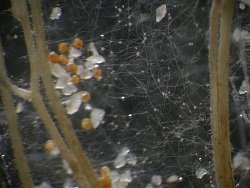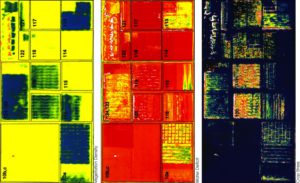Mycorrhiza fungi increase yields in a targeted and environmentally friendly way, robots help farmers to control weeds ecologically. Smallholders optimise outputs with sensors in the soil and with modern biorefineries. Both smallholder and organic farming can benefit greatly from technological developments and innovative solutions while holding on to their ideals.
Nova-Institute organizes the ‘Revolution in Food and Biomass Production (REFAB)’ conference in Cologne on October 1st and 2nd, where these themes will be discussed. Early bird discounts are available until end July, with additional discounts for participants from developing countries.

Innovative solutions for organic farming
It is easy to get the impression that organic farming and new technologies are mutually exclusive. But, quite the opposite, REFAB will present exciting technologies and concepts that optimise organic farming while at the same time staying true to its principles. This already starts at cultivation: Dr. Alok Adholeya from TERI-Deakin Nanobiotechnology Centre will present an innovative and sustainable approach based on the integration of mycorrhiza fungi and nano-bio-stimulants. It can increase the agricultural productivity of many farmers in the world in an environmentally friendly way.
Worldwide, some 80% of all farms are so-called smallholder farms on areas of up to two hectares. Such farms often form the agricultural backbone in developing countries but cannot always take into account the environment and sustainability. Here, innovation and modern technology make new solutions possible, for example by using cultivation areas more consciously through sensor technology and spatial geodata. Anil Rajvanshi, director of Nimbkar Agricultural Research Institute (NARI) in India, will show how modern precision farming, the Internet of Things and even 3D printers can help turn the country’s smallholder agriculture into an attractive and rewarding industry. Samir Sodaiya of Godavari Biorefineries Ltd., also from India, presents a different approach. He shows how a biorefinery can not only produce sugar from sugar cane, but also create further valuable products from side streams and ‘waste’. Godavari also promotes and improves sustainable agriculture through innovative solutions such as drip irrigation, precision agriculture and agro-ecological practices.

Innovative solutions in developing countries
Support for smallholders can not only reduce poverty in rural areas, but also preserve biodiversity: Gero Leson from Dr. Bronner’s Magical Soaps presents their dynamic agroforestry in Ghana, India and Samoa, from where the company receives its coconut, palm and mint oil supply. Trees are planted in mixed, stratified forests and the higher density results in higher yields, greater biodiversity and also improves the livelihoods of the local smallholder farmers. And Julius Ecuru from the BioInnovate Africa Program (BAP) shows how native plants and new technologies can be used profitably by local smallholders in East Africa, through innovative solutions as novel enzymes, alternative products made from millet or public-private partnerships.
Globalisation is putting many smallholders under pressure from large farms, subsidies and locally weak infrastructure. Again, technology can offer innovative solutions by enabling small farmers to network or create joint initiatives and cooperation through digitisation. Rajnish Gupta from Tansa will present experiences of and with smallholder farmers in emerging countries and show criteria for success in the transition to modern agriculture.
Organic farming in industrialised countries
Finally, there is also great potential for innovative solutions in organic farming in industrialised countries; modern robotics, for example, can combat weeds precisely and without chemicals. Many new ideas are specifically tailored to specific problems: At REFAB, Björn Lagerman of FriBi holding AB presents the BeeScanning App. With a smartphone camera and the app, beekeepers can fight the Varroa destructor parasite mite while observing other properties of the hive. The tool not only allows to diagnose the health of the hive, but also forms a basis for population modelling and breeding programmes.
Would you like to get an in-depth look into how innovative solutions can both shape the future of organic farming and support smallholders worldwide? Don’t miss the conference ‘Revolution in Food and Biomass Production (REFAB)’ on October 1st and 2nd in Cologne. A total of 50 speakers will present the future of food and biomass production. The conference will be accompanied by the ‘Future Protein Award’, where up and coming companies will present their innovative food or protein concepts made from CO2, insects, algae, bacteria and cell-cultured meat in the accompanying exhibition. The conference topics can choose their favourites and at the end the most convincing concepts will be awarded.
Interesting? Then also read:
Towards precision agriculture with less environmental impact
Less input, more output and lower footprint through precision agriculture and digitalisation
Insect biorefinery: it exists, it works

I prepared a tweet on this article. Is this OK? If not, I will remove it.